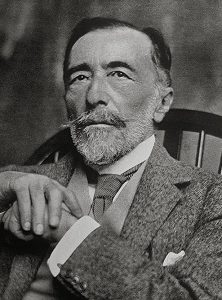 Joseph Conrad (born Józef Teodor Konrad Korzeniowski ) was a Polish-born English novelist who today is most famous for Heart of Darkness, his fictionalized account of Colonial Africa.
Joseph Conrad (born Józef Teodor Konrad Korzeniowski ) was a Polish-born English novelist who today is most famous for Heart of Darkness, his fictionalized account of Colonial Africa.
Conrad left his native Poland in his middle teens to avoid conscription into the Russian Army. He joined the French Merchant Marine and briefly employed himself as a wartime gunrunner. He then began to work aboard British ships, learning English from his shipmates. He was made a Master Mariner, and served more than sixteen years before an event inspired him to try his hand at writing.
He was hired to take a steamship into Africa, and according to Conrad, the experience of seeing firsthand the horrors of colonial rule left him a changed man.
Joseph Conrad settled in England in 1894, the year before he published his first novel. He was deeply interested in a small number of writers both in French and English whose work he studied carefully. This was useful when, because a need to come to terms with his experience, lead him to write Heart of Darkness, in 1899, which was followed by other fictionalized explorations of his life.
He has been lauded as one of the most powerful, insightful, and disturbing novelists in the English canon despite coming to English later in life, which allowed him to combine it with the sensibilities of French, Russian, and Polish literature.
Books

Heart of Darkness
Although Polish by birth, Joseph Conrad (1857–1924) is regarded as one of the greatest writers in English, and Heart of Darkness, first published in 1902, is considered by many his “most famous, finest, and most enigmatic story.” — Encyclopaedia Britannica. The tale concerns the journey of the narrator (Marlow) up the Congo River on behalf of a Belgian trading company. Far upriver, he encounters the mysterious Kurtz, an ivory trader who exercises an almost godlike sway over the inhabitants of the region. Both repelled and fascinated by the man, Marlow is brought face to face with the corruption and despair that Conrad saw at the heart of human existence.
In its combination of narrative and symbolic power, masterly character study and acute psychological penetration, Heart of Darkness ranks as a landmark of modern fiction. It is a book no serious student of literature can afford to miss.

Lord Jim
Jim, a young British seaman, becomes first mate on the Patna, a ship full of pilgrims travelling to Mecca for the hajj. When the ship starts rapidly taking on water and disaster seems imminent, Jim joins his captain and other crew members in abandoning the ship and its passengers. A few days later, they are picked up by a British ship. However, the Patna and its passengers are later also saved, and the reprehensible actions of the crew are exposed. The other participants evade the judicial court of inquiry, leaving Jim to the court alone. He is publicly censured for this action and the novel follows his later attempts at coming to terms with his past. The novel is counted as one of 100 best books of the 20th century.
It’s only those who do nothing that make no mistakes
Your strength is just an accident arising from the weakness of others.
Being a woman is a terribly difficult trade since it consists principally of dealings with men.
It was written I should be loyal to the nightmare of my choice.
My task, which I am trying to achieve is, by the power of the written word, to make you hear, to make you feel–it is, before all, to make you see.
We live as we dream–alone….
The belief in a supernatural source of evil is not necessary; men alone are quite capable of every wickedness.
Let them think what they liked, but I didn’t mean to drown myself. I meant to swim till I sank — but that’s not the same thing.

